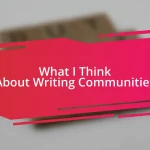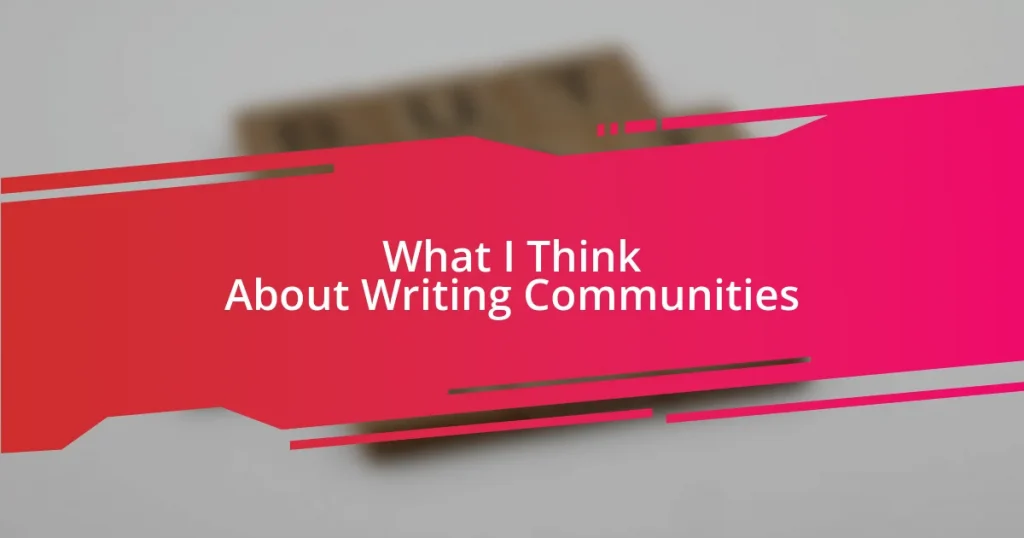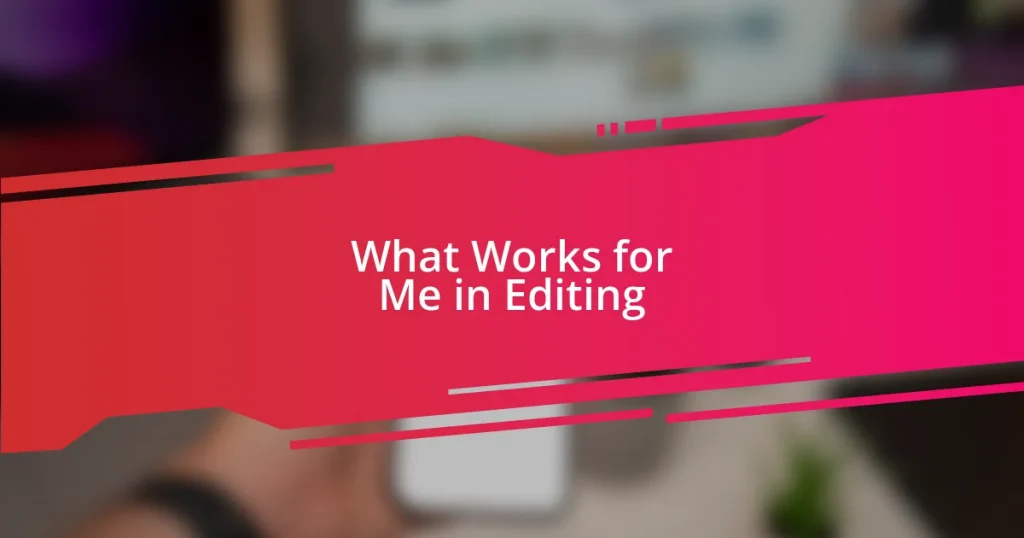Key takeaways:
- Writing communities provide support, feedback, and encouragement, helping writers overcome challenges like writer’s block and build confidence.
- Finding the right writing community involves considering factors such as genre focus, group size, engagement levels, and shared values to enhance the writing experience.
- Engaging in community resources, sharing feedback, and navigating conflicts can strengthen connections and foster personal growth among writers.
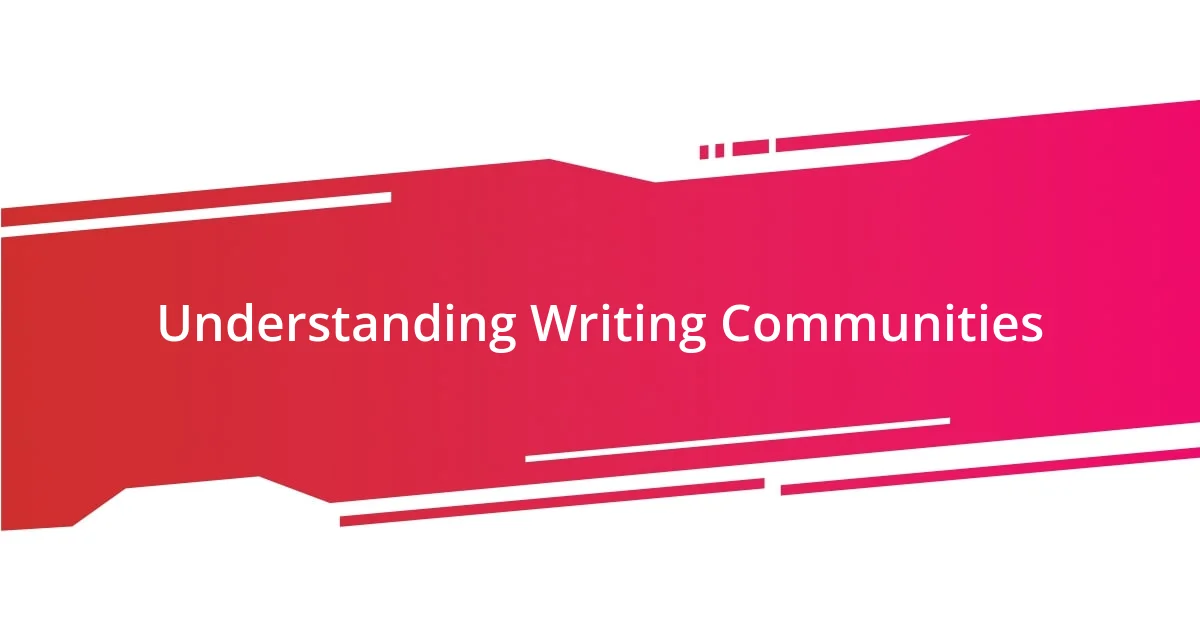
Understanding Writing Communities
Writing communities are unique spaces where writers connect, share their work, and grow together. I remember my early days as a writer, feeling isolated and unsure of my abilities. Joining a community transformed my perspective; it was like stumbling upon a treasure trove of support and inspiration.
In these communities, whether online or in-person, members offer feedback, encouragement, and even tough love when necessary. Have you ever found yourself grappling with writer’s block? I have, and it was the shared experiences of others that helped me push through those tough moments. The realization that I wasn’t alone in my struggles was truly empowering.
What’s fascinating is how diverse writing communities can be. Some focus on specific genres, while others embrace all forms of writing. I often find joy in seeing how different backgrounds contribute to a broader understanding of storytelling. It’s a reminder that every writer brings a unique voice to the table, and that variety enriches us all.
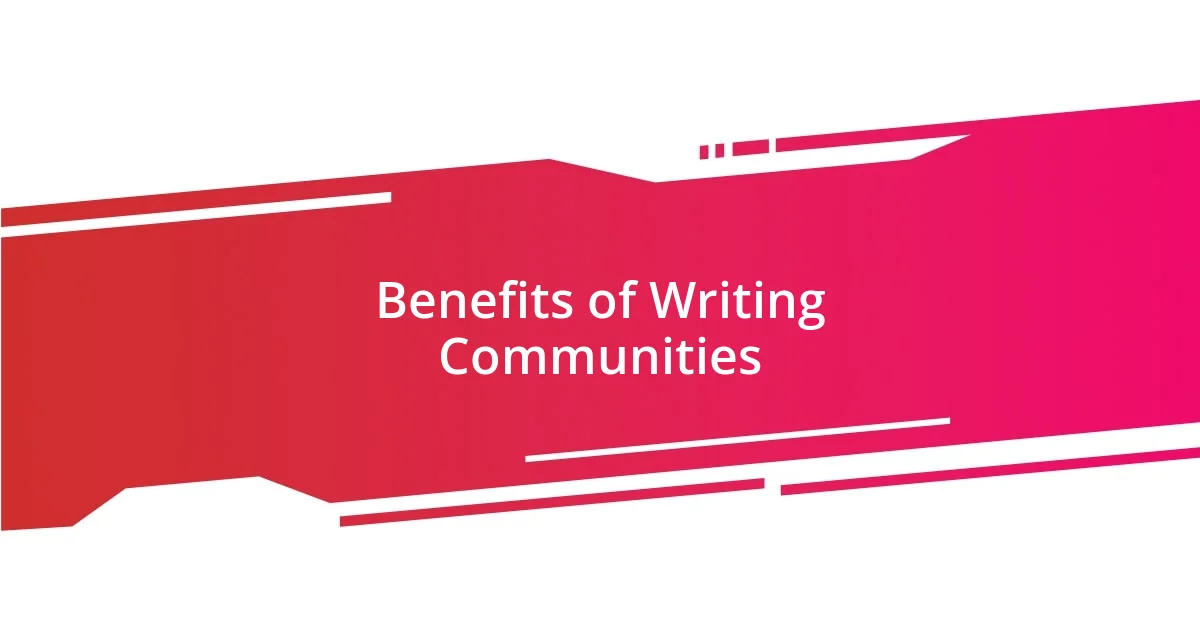
Benefits of Writing Communities
Writing communities offer immense benefits that can profoundly shape a writer’s journey. For instance, sharing work with fellow writers not only helps in honing your skills but also builds confidence. I remember how hesitant I was to share my first piece, but the constructive feedback I received was invaluable—it motivated me to continue writing and exploring my voice.
Another significant advantage is the sense of accountability that comes with being part of a writing group. When I set goals alongside other writers, I found myself more motivated to reach them. It’s interesting how the simple act of sharing my ambitions pushed me to write regularly, making the process feel less solitary and more a shared journey.
Finally, these communities foster meaningful connections. I’ve made friendships with individuals who understand the highs and lows of writing, and that emotional support is often vital during tough times. For instance, when I faced rejection, it was the encouragement from my writing peers that reminded me of my worth and the purpose of my craft.
| Benefit | Personal Insight |
|---|---|
| Feedback and Growth | Constructive critiques can spark improvement and boost confidence. |
| Accountability | Sharing goals with others drives consistency and commitment. |
| Meaningful Connections | Writers supporting writers creates a powerful network in times of doubt. |
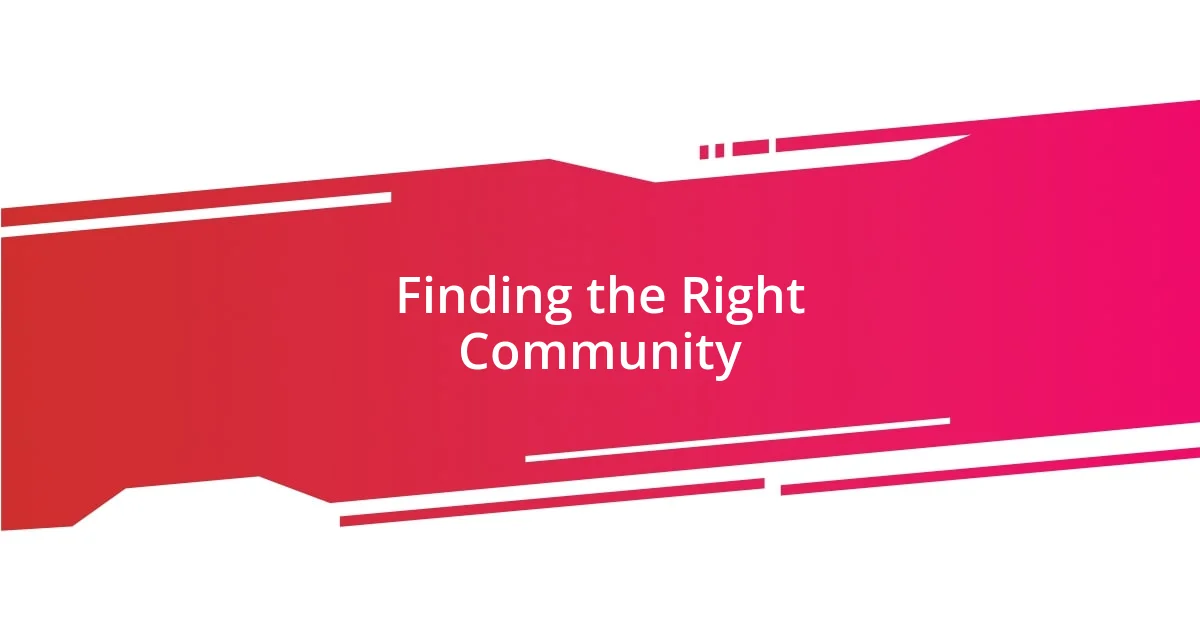
Finding the Right Community
Finding the right writing community can feel akin to dating; it takes time and a bit of trial and error. When I first began searching for my own community, I attended various workshops and online forums. Some felt welcoming and energetic, while others seemed a bit intimidating. It’s a personal journey, and sometimes you just know when a place truly fits you.
To help narrow your search, consider these important factors:
- Focus and Genre: Decide whether you want a community that specializes in your genre or one that welcomes all styles. This will influence the feedback and camaraderie you’ll experience.
- Size and Structure: Smaller groups often allow for in-depth discussions, while larger communities might offer diverse perspectives but less individual attention.
- Engagement Level: Look for a community where members are actively participating, not just lurking. This engagement can lead to more enriched discussions and feedback.
- Values and Culture: Make sure the community’s core values align with yours. A supportive atmosphere can drastically enhance your writing experience.
Remember, I discovered my best fits through trial and error. One community didn’t resonate, while another felt like a warm hug that sparked my creativity the moment I joined. It’s all about finding that perfect balance that fuels your passion!

Engaging with Fellow Writers
Engaging with fellow writers transforms the solitary act of writing into a shared experience. I recall the thrill of attending my first local writing meetup. When I heard others share their stories and struggles, it felt like I was part of something truly special. There’s something incredibly powerful about knowing that others face similar hurdles; it fosters a sense of camaraderie that is hard to replicate.
I’ve also found that discussing our work can ignite inspiration in unexpected ways. Just the other day, during a writing workshop, a fellow participant’s unique approach prompted me to experiment with my style. It left me wondering—how often do we limit ourselves by sticking to what’s familiar? Sharing ideas with other writers encourages us to step outside our comfort zones, pushing us to explore new techniques and perspectives.
Moreover, connecting with fellow writers often leads to collaborative opportunities. I remember a time when I and a few others brainstormed plot ideas over coffee. The synergy in those discussions was electric! It made me realize how much enrichment comes from collaboration, and it’s a reminder that our individual voices can harmonize to create something even greater. How could such collaborations elevate your own writing journey? The possibilities are endless.

Sharing and Receiving Feedback
Sharing feedback within a writing community has always been a pivotal part of my growth. I remember sharing a rough draft of a short story at a local meet-up, feeling nervous yet excited. The constructive criticism I received wasn’t just helpful; it was like a refreshing breeze that made me see my work from a different angle. Have you ever had one of those moments where someone else’s input makes you rethink your entire approach? I bet many writers have felt that spark of revelation!
Receiving feedback can be daunting, but I’ve realized it’s one of the most enlightening experiences. There was a time when a mentor pointed out the pacing issues in my manuscript, something I was too close to recognize myself. Initially, I felt defensive, but as I took a step back, I discovered just how valid their observations were. Embracing feedback, even when it stings, invites growth and understanding—do you find yourself taking a defensive stance, or do you strive to keep an open heart?
Sharing my own feedback with others has become equally rewarding. I vividly recall the joy I felt when a new writer thanked me for my suggestions on their character development. Seeing the excitement in their eyes as they transformed their work made me realize that feedback is a two-way street, fostering not only improvement but also connections. It makes me wonder—how often do we reflect on the impact we have when we share our insights? Every piece of feedback can create ripples of influence, shaping not just the writer but the broader community as well.
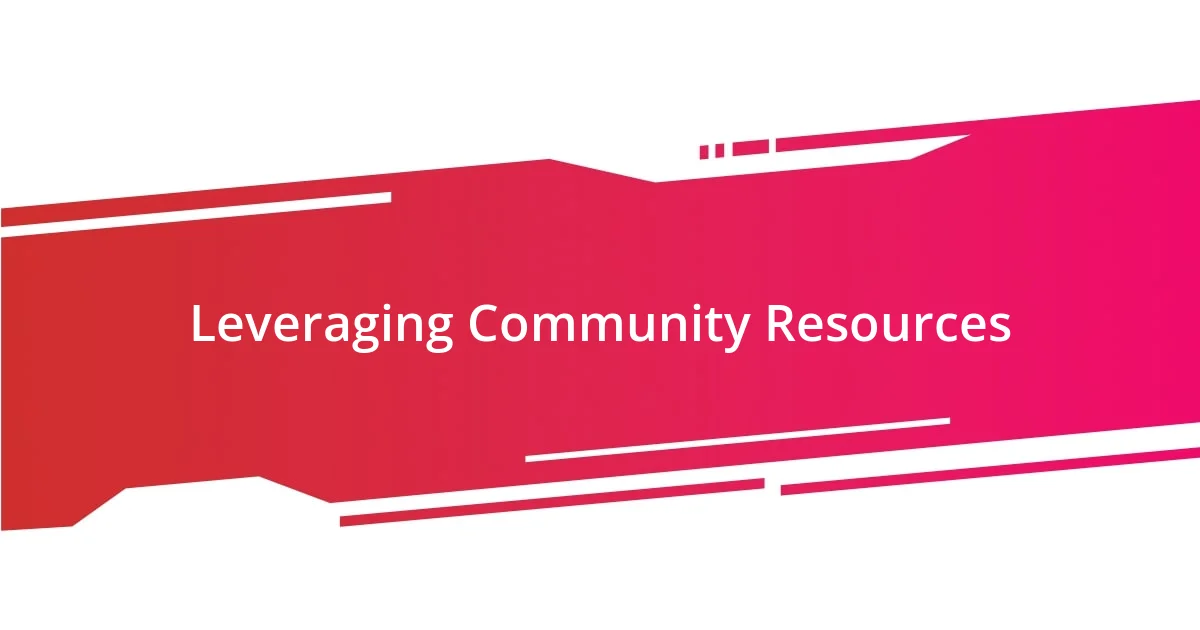
Leveraging Community Resources
Utilizing community resources has transformed my writing approach in ways I never anticipated. I remember stumbling upon a local library that hosted writing workshops every month. Attending those sessions not only honed my skills but also connected me with experienced authors who willingly shared their resources—reading lists, helpful websites, and even editing software recommendations. How crucial do you think access to such tools can be for your writing journey?
At one point, I discovered a treasure trove of online resources provided by a writing group I joined. They had compiled a list of articles, podcasts, and videos that covered everything from character development to marketing techniques. It was like having a personal library curated by fellow writers. I often found myself diving into this goldmine of information before embarking on a new project. Have you thought about how much knowledge is out there, just waiting to be tapped into?
Moreover, I’ve found local writing groups often organize events with guest speakers, offering invaluable insights into the industry. I attended a panel discussion once where successful authors shared their paths to publication. Their stories inspired me, highlighting the importance of community support. I realized that resources aren’t just about tools; they’re about connections and shared experiences that enrich our writing lives. Isn’t it fascinating how a single event can reignite your passion for storytelling?
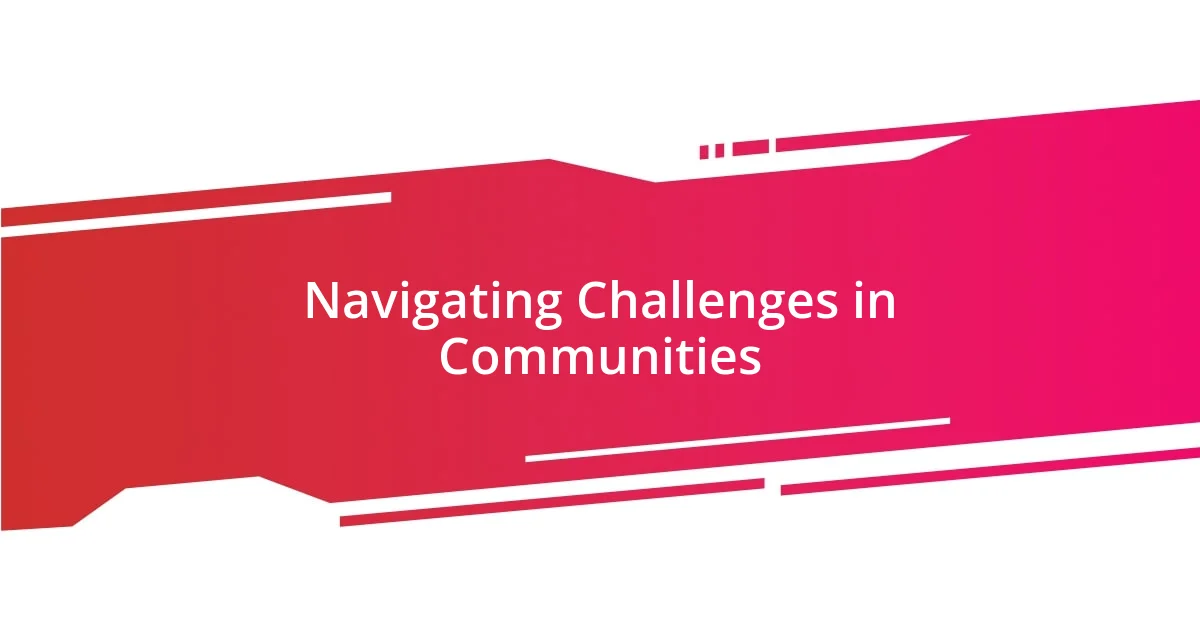
Navigating Challenges in Communities
In every community, I’ve found that conflicts can arise, and dealing with them is an art in itself. There was an instance when two members had a disagreement over the direction of a collaborative project. It was uncomfortable for everyone involved, yet what transpired was a vital lesson in communication. Empathy became the bridge that helped them navigate their differences—not an easy feat, but completely transformative. Have you witnessed a situation where listening leads to unexpected harmony?
Navigating personality clashes can also add a layer of complexity to community dynamics. I recall a time when I shared a critique that was met with defensiveness from a fellow writer; the tension was palpable. Instead of backing away, I chose to understand their perspective, which led to a much deeper and constructive conversation. It’s moments like those that remind me: have you ever realized that taking a step back can often lead to a leap forward in understanding?
Another challenge I’ve faced is the issue of engagement. I once led a group where a few members seemed disengaged, which impacted the overall energy. To address this, I initiated open discussions about everyone’s goals and expectations. The effect was remarkable; suddenly, everyone’s enthusiasm reignited. I learned that when someone feels heard, they are far more likely to contribute. Isn’t it amazing how creating an open dialogue can transform a group’s dynamic?








